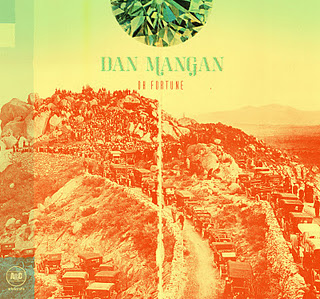Even if you happen to have been born the same year as Dan Mangan (1982) and have yet to produce anything meaningful with your life, you can’t help but listen to his third album, Oh Fortune, and find that any envy you may have been feeling has evaporated in his radiant warmth, like dew off a flower petal on a sunny August morning. It is virtually impossible not to be won over by Mangan’s gruff vocal charisma—he sounds so pure of heart when he sings, it’s like having mead poured out of the Holy Grail directly into your ear canals. You might even find yourself wanting to say “Dan Mangan, Dan Mangan, Dan Mangan,” over and over again as some kind of mantra, or in the (only slightly improbable) hopes that he will heroically appear in the nick of time to stop a building from collapsing on a group of terrified orphans.
Oh Fortune’s sound is similar to M. Ward or Badly Drawn Boy, with a lyricism reminiscent of early Leonard Cohen, almost as if an ethereal flame has been passed on, torch to torch, since ancient times from one vagabond bard to the next.
The Hive Creative Lab’s Colin Stewart (Black Mountain, Cave Singers, Yukon Blonde, Ladyhawk) produced the album and, for the most part, contributes a multidimensional quality to Mangan’s songwriting, which can be both sardonic and playful. There’s a lot of orchestral string accents and fairly elaborate arrangements, but it’s all pretty clean cut. It’s not exactly what you would call innovative or “pushing the boundaries,” as they say.
The third track, “Post-War Blues,” is an epic force of nature, sort of like watching time-lapse footage of flowers blossoming. It will be a huge hit. Sometimes, though, the album’s orchestral quality can feel a little overbearing; it’s hard to say if the big band piano jam-out and trumpet solo that concludes the album is completely necessary. Mangan’s songwriting is compelling enough when stripped to its bones, as the more subdued “Trees, Leaves, Forest” demonstrates. While perhaps not destined for radio play, it is arguably the best written song on the album.
Over all, Oh Fortune is a solid release and will undoubtedly increase the Vancouver-based singer-songwriter’s success and popularity. However, its lack of good old dissonance and experimentation makes it almost too accessible, and the threat of neophiliac ADD-induced boredom seems to lurk in its shadows.


